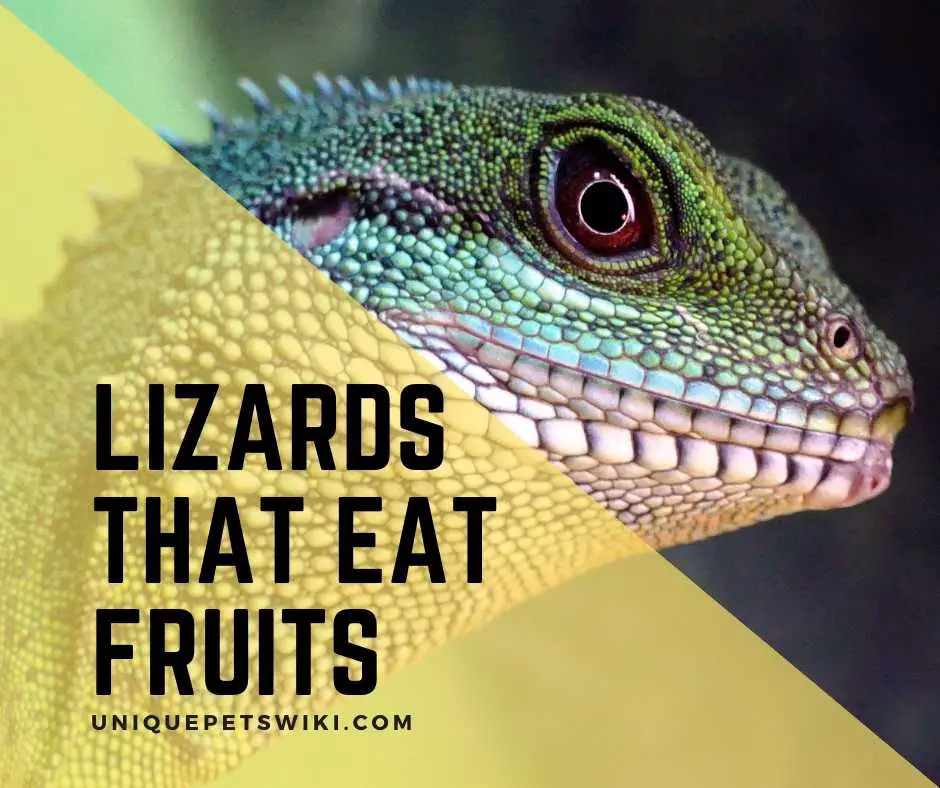There are several species of lizards that feed on a wide variety of diets. These include a diet of insects, meats, vegetables, and fruits.
But are there lizards that eat fruits? Or are there lizards that mainly feed on fruits?
While some of these lizards are herbivores, some are carnivores and omnivores.
Some lizards can eat fruits besides vegetables and insects, while others can eat fruits and vegetables entirely. On the other hand, some other lizards live only on insects.
Of all these food sources, fruits are the most readily available. And because of its availability and the fact that pet lizards love to eat fruits, many reptile owners offer fruits to their pet lizards.
The fact that your lizard loves or enjoys eating fruits doesn’t mean it should be given to him in large quantities or often.
How much fruit to feed and in what quantity is dependent on the species.
So, the question is- Are your lizards on the list of heavy fruit eaters or occasional fruit eaters? Let’s find out together.
This article is a must-read as it’ll expose you to the list of pet lizards that feed mainly on fruits.
It’ll also expose you to the list of pet lizards that occasionally eat fruits and those to be given fruits as treats.
That said, let’s delve into the article in detail.
This article has been reviewed by Dr. Dilber. Read more about our knowledge control process here.
Contents
How Many Lizards Are There That Can Eat Fruits?
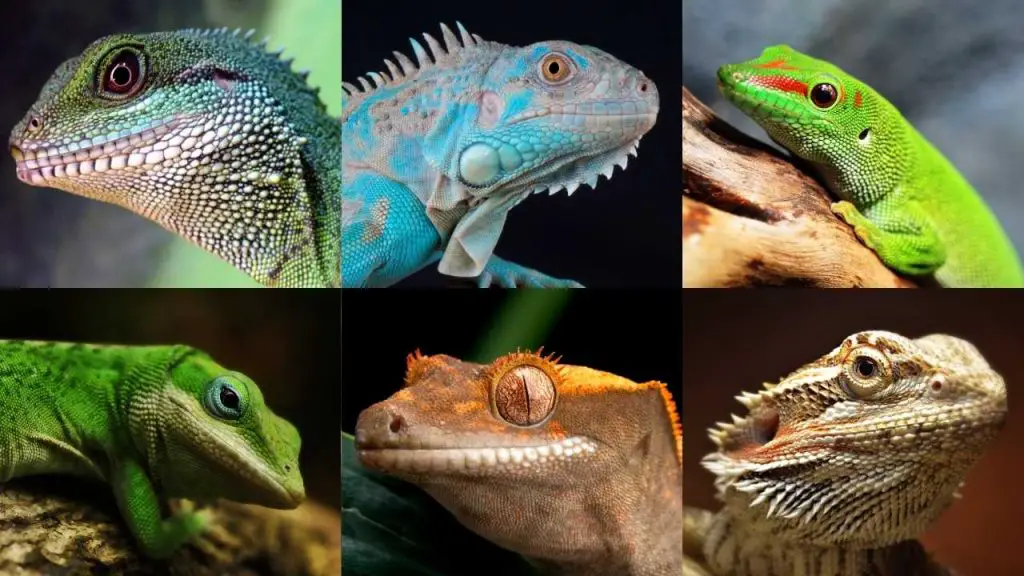
Many lizards can eat fruits, although fruits may not be their staple food.
Even in the wild, some lizards are seen eating fruits once in a while.
But are fruits beneficial to them? Should you give them fruits in captivity? Are their systems designed in a way to handle the intake of fruits?
In subsequent sections, we’ll answer these questions. But we can explore it later. Now let’s answer our main concern. Which lizards will eat fruits?
Lizards that can eat fruits either as a staple diet or occasional foods are:
- Crested geckos
- Day geckos
- Iguanas
- Chuckwallas
- Uromastyx
- Bearded dragons
- Bluetongue skink
- Chinese water dragon
- Argentine black and white tegu
- Green anole
- Gidgee skink
- Green iguanas
- Green basilisk
- African fire skink
Lizards That Mainly Feed on Fruits
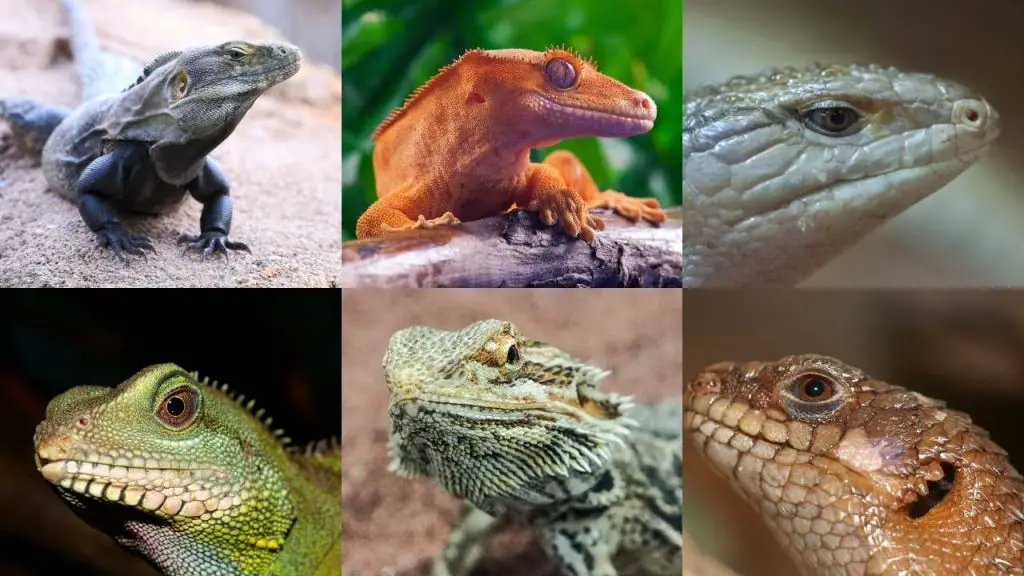
If you desire a healthy pet, then you must give attention to its dietary needs. Only feed your pets what is good for their body systems and not what you feel is beneficial.
Some lizards can handle a lot of fruit intake while other species cannot. Some lizards live in deserts or places where there is low availability of water. Fruits have high water content and lizards get most of their water from their food. So, that’s why lizards eat fruits to get water.
For this reason, you have to be sure that what you give your pet lizard is what it needs. That said, below is a list of lizards that feed mainly on fruits.
Chuckwallas
The Chuckwallas are one of the largest species of lizards found in the Southwestern part of America. In the wild, they feed mainly on leaves and fruits. The main type of leaves they feed on are flowers of annual and perennial plants.
With this in mind, the Chuckwallas will feed fine on a diet of fruits and vegetables in captivity.
Crested Geckos
In the wild, crested geckos can eat fruits in large quantities. However, this doesn’t mean that they thrive exclusively on fruits.
Their diets of insects comprise about 10% fruits. More than this quantity in a week may cause serious health issues to the lizard.
Hence, in captivity, crested geckos can eat fruits several times a week. You should not offer fruits every day. You can offer a maximum of 3 to 4 times a week if it is healthy. not more than that is recommended. Many crested gecko owners have reported that their lizards love mashed fruits such as bananas, nectarines, and peaches.
Blue Tongue Skink
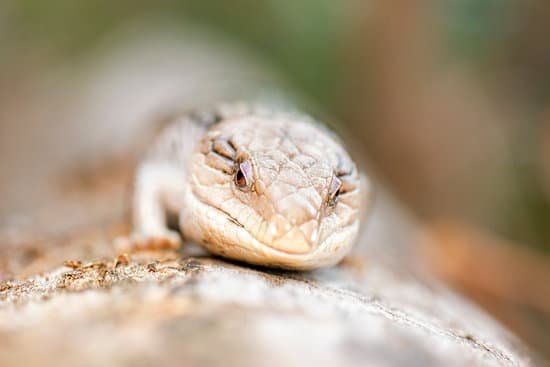
These bright blue-tongued lizards are native to Australia, Indonesia, parts of New Guinea, and Tasmania. They are omnivores. This means that they eat mostly fruits, vegetables, and also meat.
For blue tongue skinks, fruits and vegetables constitute a greater percentage of their diet. Hence, in captivity, they should be given many fruits and vegetables and sometimes meat. The meat is best given alongside vegetables or fruits.
When it comes to blue tongue skinks, not all fruit types are appropriate for their health. Some fruits with high amounts of phosphorus are highly toxic and are to be avoided.
For this reason, it’s advised that you research more on what fruits to give your blue tongue skink and what fruits to avoid. You can read about that in detail here.
Chinese Water Dragon
Naturally, Chinese water dragons are omnivores, which means they should consume more vegetables and fruits in their diet. However, in the wild, they’re observed to eat insects and other small animals more than they eat fruits and vegetables.
Thus, in captivity, a wide variety of meat, insects, fruits, and vegetables should be incorporated into their diet.
Argentine Black And White Tegu
The Argentine black and white tegu is a pet lizard native to the Eastern and Central parts of South America. In these regions, they’re found in tropical rainforests, semi-deserts, and savannas.
They also go by different names such as the Argentine giant tegu, the black and white tegu, the huge tegu, and in Spanish as the Lagarto overo.
In the wild, they feed on a diet of insects, fruits, eggs of other animals, and plant seeds. Their diet preferences change as they grow with age. Juvenile Argentine black and white tegus eat a wide range of invertebrates such as snails, insects, spiders, and many more.
As they get older, they become more predatory. At this age, they can eat the eggs of other small animals and seeds.
Bearded Dragon
Bearded dragons are one of the most popular and beginner-friendly pets. Bearded dragons are diurnal lizards and are omnivores. In the wild, they eat a variety of foods to include insects and fruits.
In captivity, fruits and vegetables should constitute 20-25 percent of their diet. The percentage of fruit in the diet depends on the age of the bearded dragon. For juvenile bearded dragons, 10 to 15% is recommended while for adult bearded dragons 20 to 25% is recommended.
Too much fruit in their diet can lead to serious health issues. Thus, note that its diet of fruits shouldn’t become its staple food.
Gidgee Skink
These species of lizards are unique for their qualities of moving in groups. They are natives of Australia and are omnivores.
In the wild, they eat a wide variety of foods such as roaches, insects, crickets, leafy greens, and fruits. In captivity, gidgee skinks will thrive on all kinds of insects, fruits, and vegetables.
For this reason, as a good keeper, you’re should offer your skink a variety of foods to ensure good health.
Lizards That Can Only Eat Fruits Occasionally or as a Treat
Dieting is an important part of pet care. Knowing the right food to feed to your pet and the right quantity is important to ensure that your pet is in optimal health.
For this reason, pet lizards aren’t just given food items simply because you think they enjoy eating them. You also don’t give them food items because you think the foods are beneficial to them.
What should always be taken into consideration is their body’s system. You should only offer them food based on their ability to absorb the nutrients in the food without creating problems for their health.
That said, not all pet lizards require a heavy amount of fruits in their diet, and your lizard may be one.
Below is a comprehensive list of pet lizards that feed occasionally on fruits in the wild. For these lizards, since fruits aren’t their staple food, giving them too much in captivity will create health problems.
The reason is that their body systems aren’t built to handle too much fruit. They include:
Green Iguanas
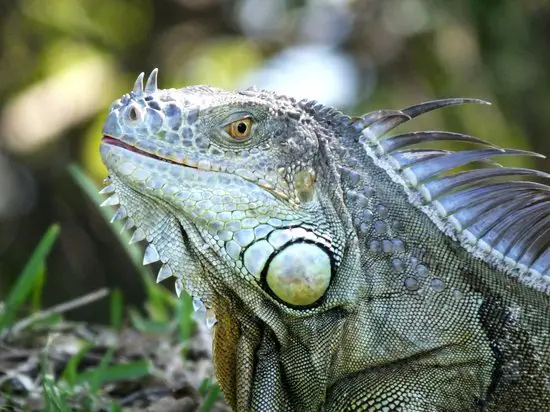
The green iguanas are native to the Central and Southern parts of America. They are often called iguanas. They are large lizards that can grow up to 6 feet in length. These lizards are strict herbivores.
Iguanas cannot have animal protein because they cannot metabolize it, as green iguanas are herbivores. As a result, it can cause organ damage. However, focus on the fruits and green iguanas.
Green iguanas complete their protein requirement by plants. They metabolize plant protein and use it for the growth and development of muscles and tissues. For this reason, their diets in the wild are mainly leafy greens, vegetables, and flowers.
You might also like: Iguanas can eat pineapple
They sometimes eat fruits too. Thus, in captivity, they should only be given fruits occasionally as treats. Note that in doing so, fruits should never become their main diet.
Day Geckos
Day geckos are insect-eating lizards. Their main food in the wild is insects and occasionally tropical fruits such as papaya and mangoes.
Thus in captivity, their wild habitat can be replicated by giving them fruits once in a while.
Green Anoles
These species of lizards are not fruit eaters. However, a treat of fruits can be added to their diet once in a while.
Green Basilisk
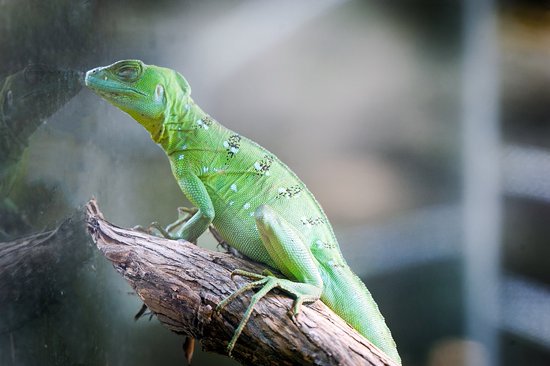
These species of lizards are native to the Central parts of America.
They are known for running over water. In the wild, they feed on mice, invertebrates, and occasionally on fruits.
Thus, in captivity, giving fruits to them should be once in a while or as treats.
African Fire Skinks
As the name suggests, these species of lizards are native to Africa. They are carnivores, eating mainly insects such as mealworms, crickets, scrambled eggs, and cooked meats. As pets, they are given fruits occasionally as treats.
Uromastyx
The uromastyx are also known as spiny-tailed lizards. They’re similar in nature and cage requirements to bearded dragons. They are herbivores that eat mainly vegetables and sometimes insects.
In captivity, their diet can include some amount of fruits. But this should be in small quantities. In the wild, they aren’t heavy fruit eaters.
Lizards That Do Not Eat and Should Not Be Fed Fruits
If you’re keeping any of these species of lizards and you’re wondering if they eat fruits, the truth is that these lizards don’t eat fruits. They’re strictly carnivores.
In that case, you shouldn’t bother to include fruits in their diet. They include the common leopard gecko, savannah monitor, African fat-tailed gecko, the common house gecko, or the gecko. These lizards are obligate carnivores. So, they do like to eat fruits.
Wrapping Up
When it comes to pet lizards, there are many of them that this article hasn’t done justice to. Each of these lizards is unique in the sense that they have certain requirements different from one another.
Regarding their diet, what type of food a lizard eats is a factor of its species, age, and activity level. Thus, whether your pet lizards will eat fruits or not is dependent on their species.
As you can see from this article, some pet lizards are heavy fruit eaters, while others only consume fruits occasionally.
If your species of lizards aren’t discussed in this article, it’s advisable you do more research on them to ensure that your pets eat fruits or not.
As noted in this article, some pet lizards can eat fruits, but that doesn’t mean that they should be fed on a diet of fruits.
